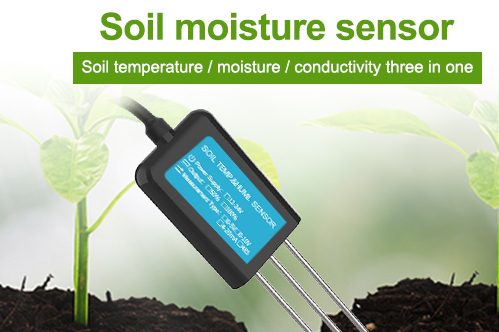In the field of modern agriculture, advanced technology has revolutionized traditional farming methods. Soil moisture sensor are devices that significantly affect agricultural efficiency. Soil humidity sensor play a vital role in optimizing irrigation methods, conserving water and increasing crop yields. This article will delve into the significance of soil moisture sensors in agriculture, their functions, and the benefits they provide to farmers.
Learn about soil humidity sensor
Soil humidity sensor, also known as soil moisture meter, is an electronic device used to measure soil moisture content. Humidity sensors provide real-time data on soil moisture. Enable farmers to make informed decisions based on irrigation plans and ensure that crops receive the right amount of water. Precision irrigation not only optimizes water use, but also promotes healthier plant growth.

Key functions of soil humidity sensors
accurately assess the moisture status
One of the key functions of soil humidity sensor is to accurately assess the moisture status of the soil throughout the growing season. These sensors are typically embedded in the root zone of the crops, where they continuously monitor the soil moisture levels. The data collected by the sensors is transmitted to a central monitoring system, where it can be analyzed to determine the optimal irrigation requirements for different areas of the field. This targeted irrigation approach allows for the customization of water application based on the specific needs of different crops and soil types, leading to more efficient water usage and improved crop health.

Reduce water waste
Furthermore, soil humidity sensors contribute to the conservation of water resources by minimizing water wastage through over-irrigation. By providing farmers with real-time feedback on soil moisture levels, these sensors help prevent the unnecessary application of water when the soil already contains sufficient moisture. This not only saves water but also reduces the energy and costs associated with pumping and distributing excessive amounts of water. In regions facing water scarcity or drought conditions, the implementation of soil humidity sensors can be particularly beneficial in ensuring the sustainable use of limited water supplies for agricultural purposes.
Optimize fertilizer application
In addition to water conservation, soil humidity sensors also facilitate the optimization of fertilizer application. Soil moisture levels influence the uptake of nutrients by plants, and by monitoring soil moisture content, farmers can adjust their fertilization practices to ensure that nutrients are applied when plants are most receptive. This targeted approach to fertilization not only improves nutrient efficiency but also minimizes the risk of nutrient leaching into the environment, thereby reducing the potential for water pollution and environmental degradation.
Crop management strategy
By taking weather conditions into account, farmers can optimize irrigation plans and reduce the amount of water in their crops. This proactive approach to water management not only increases crop productivity but also contributes to sustainable agricultural operations.
conclusion
In conclusion, soil moisture sensors are a valuable tool in modern agriculture, offering many benefits, water conservation and increased crop productivity. Using real-time soil moisture data, farmers can make informed irrigation decisions. Thus, water resources can be used effectively and agricultural output can be increased. As agriculture continues to embrace technological advances, soil moisture sensors hold promise for solving water shortages and optimizing agricultural resources.
